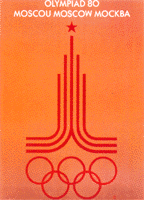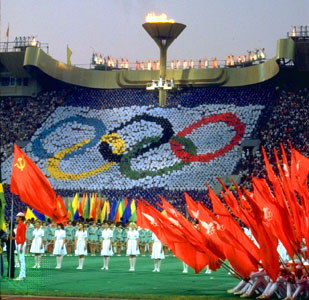 |
Moscow, U.S.S.R., 1980
 |
| Olympic posters from the Archives, Olympic Museum Lausanne,
from the book The Olympic Spirit,
published by Tehabi Books |
The Soviet invasion of Afghanistan
in December 1979 led to the largest boycott in the history of
the Olympic movement. U.S. president Jimmy Carter took the lead
in the call for a boycott of the 1980 Olympics, and approximately
60 other nations joined the Americans in staying away from Moscow.
A number of Western nations did not observe the boycott, notably
Great Britain, France, Italy, and Sweden. In all, about 5,000
athletes representing 81 nations did attend the Games. Protests
against the Soviet presence in Afghanistan continued, however.
Several of the participating nations refused to attend the opening
ceremony, and the Olympic hymn was played at several medal ceremonies,
rather than the appropriate national anthem. The Games were
also hurt by rowdy behaviour from spectators, cheating by officials,
and security so intrusive that winners in track events were
physically prevented from taking victory laps.
 |
| Opening ceremonies, Moscow, 1980 |
| Francolon Simon--Gamma Liaison
|
The level of competition clearly suffered
from the boycott. The Soviet team won 80 gold medals and 195
medals in all in the most lopsided final tally since the U.S.
domination of the 1904 Games. The track-and-field competition
saw several disappointing times. The 800- and 1,500-metre runs
boasted the world's two best performers, Steve Ovett and Sebastian
Coe, both of Great Britain. Although Ovett won the 800-metre
run and Coe the 1,500-metre, both races were characterized by
overly cautious running and unimpressive times. The 5,000- and
10,000-metre runs were won by Miruts Yifter of Ethiopia.
The East German women dominated the swimming competition as
they had in 1976, capturing 11 of the 13 gold medals. The Soviet
men, led by Vladimir Salnikov, won seven events.
|

